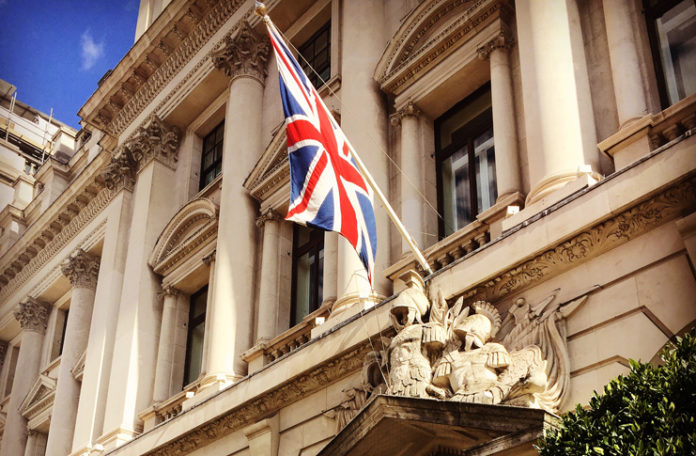TravelingForMiles.com may receive commission from card issuers. Some or all of the card offers that appear on TravelingForMiles.com are from advertisers and may impact how and where card products appear on the site. TravelingForMiles.com does not include all card companies or all available card offers.
Some links to products and travel providers on this website will earn Traveling For Miles a commission that helps contribute to the running of the site. Traveling For Miles has partnered with CardRatings for our coverage of credit card products. Traveling For Miles and CardRatings may receive a commission from card issuers. Opinions, reviews, analyses & recommendations are the author’s alone and have not been reviewed, endorsed, or approved by any of these entities. For more details please see the disclosures found at the bottom of every page.
The UK government recently tightened up the testing requirements that travelers visiting England are expected to adhere to before and after their inbound flights, and a close look at the new rules suggests that anyone who has recently recovered from Covid could face issues.
Before I go into the issues facing travelers who have recently recovered from Covid it makes sense to go over the new rules for entry into England.
The new rules for entry to England
Vaccinated travelers
Before you travel to England you must:
- Take and pass a COVID-19 test – to be taken in the 2 days before you travel to England
- Book and pay for a COVID-19 PCR test – to be taken within two days of arriving in England (the ‘Day 2’ PCR test).
- Complete a passenger locator form – to be completed in the 48 hours before you arrive in England
When you arrive in England you must:
- Take the ‘Day 2’ COVID-19 PCR test. This is the test that you booked before travel.
- You can take the test any time after you arrive and before the end of day 2 at the latest. The day you arrive is day 0.
- You must quarantine in your home or the place you are staying while you await your test result.
If your test result is negative, you can end your quarantine. If your test result is positive, you must self-isolate for 10 full days. The day of the test is day 0.
Non-vaccinated travelers
Before you travel to England you must:
- Take and pass a COVID-19 test – to be taken in the 2 days before you travel to England
- Book and pay for day 2 and day 8 COVID-19 PCR tests – to be taken after arrival in England
- Complete a passenger locator form – to be completed in the 48 hours before you arrive in England
When you arrive in England you must:
- Quarantine at home or in the place you are staying for 10 full days
- Take the COVID-19 PCR tests you booked before you traveled – you must take the first test on or before day 2 and the second test on or after day 8. The day you arrive is day 0.
- If you are in England for less than 10 days, you need to quarantine for the time you are in the country and you still need to book day 2 and day 8 PCR tests. You only need to take the tests if you are still in England on those days.
If your day 2 test is positive, you must self-isolate for 10 full days. The day you took the test is day 0. You do not need to take the day 8 test if your day 2 test is positive. If your day 2 test is negative, you must take your day 8 test. If your day 8 test is positive, you must self-isolate for 10 full days. The day you took the day 8 test is day 0.
If your day 2 test is negative, you must continue to quarantine. You must take your day 8 test on or after day 8. If your day 8 test is negative, you can stop quarantine on whichever is later: day 10 or whenever you receive the day 8 test result.
England’s test to release scheme can be used to end quarantine on or after day 5 – see here for more details.
The issues for those recently recovered from Covid-19
The key issue for anyone who has just recovered from Covid and who wants to visit England is this:
If you have recently recovered from Covid, you are at risk of triggering a false negative Covid test result and England does not offer test exemptions for those who have fought off the virus.
The pre-departure issue
While the pre-departure testing rules for the United States say the following:
“If you recently recovered from COVID-19, you may instead travel with documentation of recovery from COVID-19 (i.e., your positive COVID-19 viral test result on a sample taken no more than 90 days before the flight’s departure from a foreign country and a letter from a licensed healthcare provider or a public health official stating that you were cleared to travel).”
The pre-departure resiting rules for England say this:
“If you have recently recovered from COVID but are no longer infectious, you should use a lateral flow device (LFD) test. LFD tests have a lower sensitivity than PCR or LAMP tests, so they are less likely to return a positive result from a historic infection”
While the rules for the US take into account the fact that someone who almost certainly poses no risk whatsoever (given that they have just beaten back the virus) may trigger a false positive, England’s rules do not.
In fact, England’s rules effectively say “if you have recovered from Covid and want to travel, take the least accurate Covid test you can find (that still conforms to standards) and hope for the best“.
To me, that sounds more than a little idiotic, but there’s no other way to interpret what the government website says.
Put simply, if you have recently recovered from Covid, the UK government still expects you to take a Covid test before you fly (even though you are at greater than average risk of returning a false-positive result) and if you fail that test, you will not be allowed to board your flight to England.
On a positive note, I know someone who recovered from Covid a little under two weeks ago and who can now pass an antigen/lateral flow test, but that will not be the case for everyone.
The arrival issue
Unfortunately, the issues faced by travelers who have recently recovered from Covid-19 are not limited to the pre-departure test. In fact, the worst issue is faced upon arrival in England.
Even if a traveler successfully passes the pre-departure Covid test, they still have to take a ‘Day 2’ test after they arrive in England and unlike the pre-departure test, the day 2 test cannot be an antigen/lateral flow test. The day 2 test has to be a PCR test which by the UK government’s own admission (see the quoted passage above), is more likely to return a false positive if you’ve previously been infected with Covid-19.
I’ve searched all the UK government’s pages that cover the rules for the testing requirements for arrivals in England and there isn’t a single mention of a day 2 exemption for travelers who have recently recovered from Covid-19 (here’s a link to the main page – take a look for yourself).
What this means is that someone who has recently recovered from Covid-19 may well trigger a positive day 2 test when they arrive in England and will then be expected to self-isolate for 10 full days from the day the test was taken. Moreover, anyone who traveled with this person will also be expected to self-isolate for 10 days regardless of what their PCR tests say (link).
Put simply, someone who has recently recovered from Covid-19 and who travels to England is at risk of triggering a positive day 2 PCR test and having to self-isolate for 10 days even if they pass the pre-departure antigen/lateral flow test. For most visitors to the UK, that would be a terrible scenario to have to face.
Bottom line
People who have recently recovered from Covid-19 are at greater risk than most of triggering a false positive when taking a Covid test and because the UK government does not offer a testing exemption for travelers who have recently recovered from Covid-19, this means that anyone who has recently fought off the virus may find themselves unable to fly to England courtesy of a false positive pre-departure test. Worse yet, they may pass the pre-departure test only to find that they fail their arrival test and find themselves having to self-isolate for 10 days.
A lot of travelers who have recovered from Covid-19 may find that this isn’t an issue as, for whatever reason, they will find that they are capable of passing all the tests they have to take. For others, however, England’s lack of a testing exemption for those who have recently recovered from Covid-19 could be a serious issue and it’s something that is worth keeping in mind if it could affect you or those with whom you are traveling.





![Buy up to 210,000 Marriott Bonvoy points from 0.89 cents each [Targeted] a pool with a building and trees in the background](https://travelingformiles.com/wp-content/uploads/2021/10/JW-Marriott-Khao-Lak-Resort-Thailand-741-356x220.jpg)
![Buy up to 500,000 IHG One Rewards points at just 0.5 cents each [Targeted] a beach with palm trees and chairs and umbrellas](https://travelingformiles.com/wp-content/uploads/2021/10/ihg-intercontinental-bora-bora-741-80x60.jpg)









You’re nomenclature is false. A positive PCR test is a positive test, not a false positive. The test detected the RNA. It did it’s job.
Also you call the antigens tests less accurate and that is also false, they are highly accurate. They test for different things than PCR tests. They Test for antigens, which have a different profile during your infection than presence of RNA. Your body produces antigens in response to an infection and those quickly dissipate as your body clears the infection. Hence you are more likely to test negative on an antigen post infection
PCR can still test positive because little snippets of dead inactive RNA could still be floating around in your body, even though they are not actively replicating within your cells.
Lastly there is nothing wrong with Englands policy. Seems sound to me, if you don’t like it, you don’t have to go there.
The Covid tests being used for the purposes of travel are there to detect the presence of transmittable Covid-19 so if they flag someone as positive when that person does not actually have transmittable Covid-19, it’s a false positive. I’m comfortable with how I used that phrase.
ETA: The lateral flow tests may be accurate for what they’re looking for but they’re not as accurate as PCR tests when it comes to determining if someone has Covid-19… which is the whole point of the tests from a travel standpoint. The ultimate proof of this is that the UK government advises people who have tested positive via a lateral flow/antigen test to submit to a PCR test as well. If lateral flow/antigen tests were as accurate as PCR tests at confirming that someone is positive for Covid-19 this would be an unnecessary step.
And what if you are English and live and work in the UK? As someone who currently has covid and wants to return home, how do I get back to my home country without needlessly doing 10 more days self-isolation? Let alone the time, resources and expense wasted on doing a pointless PCR test? The fact I will have a digital exemption certificate on the UK NHS app should render the need for a test that may show a false positive as unnecessary.
Antigen tests are far less sensitive than PCR. And your nomenclature is false: antigen is not something that your body produces – you are thinking of antibodies, perhaps. Antigen is the protein that the virus is comprised of.
Lateral flow/rapid antigen tests for viral proteins and PCR test for tiny snippets of viral proteins, amplifying them to find the smallest amounts. That is what make PCR more sensitive (but also prone to false positives, depending on how many cycles of amplification are used which varies depending on how the people that are doing the test set it up)
I am as we speak caught up in this vortex of rushed planning.
I’m currently in the US having recovered from a thankfully mild dose of covid (thank heavens for my 3 jabs) Able to pass an antigen test so I’m considered recovered but it’s highly unlikely I’ll pass the day 2 PCR on my arrival home.
So after isolating whilst ill and recovering, I’m now going to be treated as if I’m ill again from day one
The fact aside that if I stay at home with my family, they too will have to isolate all through Christmas and new year, I consider myself a productive member of society and being removed from the work face will leave me unable to contribute to the recovery we so desperately need.
One problem with with PCR test is they are very sensitive to bits of the RNA that are floating around in your body for up to 3 months after youre infected the NHS seem to suggest (after you take a PCR test to back up your positive Lateral Flow Test) as they advise against taking another PCR test for 3 months.
This poses a real dilemma for people recently recovered from Covid. I currently have mild Covid, day 5 of isolating after my positive PCR result. I am hoping 5 days to get 2 consecutive days of negative lateral flow tests showing I’m no longer infectious. My family and I have flights for Sydney, Australia booked on 9 Jan 2022 as we’re emigrating. While Australia will accept certification from my doctor that I’m not infectious, Hong Kong, where we are in transit for 4 hours will only accept a negative PCR test. This is a real problem for a lot of people. I’m trying to figure out a way around this. We’ve quit our jobs and all our possessions are on their way to Australia. Any suggestions welcome as we’ve already delayed our departure by 6 weeks owing to another issue.
There is another very popular way. Many people use previous test codes to fill the form. They do not bother taking test. I knew dozens of those. When they were asked about test they just say it was negative or they wait results. Track and trace never pursue those. I know people who travelled 4-5 times on the same codes in different changing travel conditions.